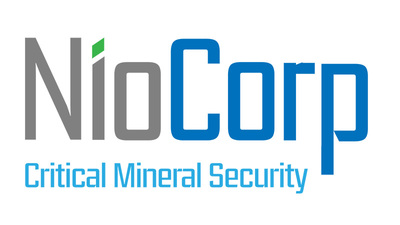NioCorp Teams With Industry Alliance to Urge Congressional Approval of Tax Incentives for Permanent Rare Earth Magnets Made in the U.S.
NioCorp Developments Ltd. (OTCQX: NIOBF) participated with industry leaders to urge U.S. Congress to pass bipartisan legislation that would create tax incentives for U.S.-made permanent rare earth magnets. The proposed HR 5033 bill suggests a $20 per kilogram credit for U.S. manufactured magnets, increasing to $30 if all materials are sourced domestically. This initiative aligns with the Biden Administration's goal for 50% of new vehicles sold by 2030 to be electric, a sector reliant on rare earth materials. NioCorp is exploring rare earth production alongside its Elk Creek Project, which targets niobium, scandium, and titanium.
- Support for bipartisan HR 5033 bill could enhance investment in U.S. rare earth production.
- Potential tax credits of $20-$30 per kilogram for U.S. manufactured magnets may boost company revenues.
- NioCorp aims to produce rare earth elements alongside its current project, diversifying its product offerings.
- None.
Insights
Analyzing...
CENTENNIAL, Colo., Aug. 30, 2021 /PRNewswire/ -- NioCorp Developments Ltd. ("NioCorp" or the "Company") (TSX:NB) (OTCQX:NIOBF) joined with a group of rare earth industry players to urge the U.S. Congress to approve bipartisan legislation in order to provide tax incentives for U.S. manufacturing of permanent rare earth magnets in the United States.
In a letter delivered to the Democrat and Republican leaders in the U.S. House of Representatives, the industry coalition urged support for HR 5033, cosponsored by Reps. Eric Swalwell (CA-15) and Guy Reschenthaler (PA-14), and urged that its provisions be added to pending federal infrastructure legislation. The bill would create a
Rare earth magnets are used in a variety of applications, such as electric vehicles, wind power turbines, home appliances, factory automation systems, computers, cellphones, and energy-saving electric motors. The majority of all electric vehicles made today contain a powertrain driven by rare earth magnets, and virtually all modern automobiles use rare earth magnets in smaller electric motors throughout the vehicle.
The Biden Administration recently issued an executive order setting a goal that
NioCorp is currently evaluating the potential for production of rare earth elements ("REEs") as a byproduct of planned production of the critical minerals niobium, scandium, and titanium from the Elk Creek Project (the "Project"), subject to receipt of necessary project funding. The Company's REE initiative was launched in response to intense interest by governments and industrial consumers around the world for additional sources of rare earths beyond current suppliers.
Commercial rare earth products currently being examined for potential production by NioCorp include neodymium-praseodymium oxide ("NdPr"), dysprosium oxide ("Dy2O3"), and terbium oxide ("Tb4O7"). These are the primary REEs used to manufacture the world's most powerful permanent magnets, known as neodymium-iron-boron ("NdFeB") magnets.
Other legislative proposals in the U.S. Congress would provide a variety of tax incentives for the mining of REEs and the production of separated rare earth oxides, which NioCorp is considering.
"This bipartisan legislation would provide important tax incentives for the production of permanent rare earth magnets, which, if enacted, could provide powerful incentives for investment across all areas of rare earth production in the U.S., from mining to magnet manufacturing," said Mark A. Smith, CEO of NioCorp. "We are pleased to support this legislation and to work in this alliance to push this bill and other legislative initiatives designed to promote greater production of these and other critical minerals in the U.S."
@NioCorp $NB $NIOBF #ElkCreek #Niobium #Scandium #Nebraska #rareearth #Swalwell #Reschenthaler #magnets
For More Information:
Contact Jim Sims, VP of External Affairs, NioCorp Developments Ltd., 720-639-4650, jim.sims@niocorp.com
About NioCorp
NioCorp is developing a superalloy materials project in Southeast Nebraska that will produce Niobium, Scandium, and Titanium. The Company also is evaluating the potential to produce several rare earth byproducts from the Project. Niobium is used to produce superalloys as well as High Strength, Low Alloy ("HSLA") steel, which is a lighter, stronger steel used in automotive, structural, and pipeline applications. Scandium is a superalloy material that can be combined with Aluminum to make alloys with increased strength and improved corrosion resistance. Scandium is also a critical component of advanced solid oxide fuel cells. Titanium is used in various superalloys and is a key component of pigments used in paper, paint and plastics and is also used for aerospace applications, armor, and medical implants. Magnetic rare earths, such as Neodymium, Praseodymium, Terbium, and Dysprosium are critical to the making of Neodymium-Iron-Boron ("NdFeB") magnets, which are used across a wide variety of defense and civilian applications.
Forward-Looking Statements Disclaimers
Certain statements contained in this news release may constitute forward-looking statements, including statements regarding the success of the Company's effort to support federal tax incentives for the production of rare earth products, the Company's expectations that the Project will reach production stage if it is able to secure project financing, and its ability to produce its planned products commercially. Readers are cautioned that such forward-looking statements involve known and unknown risks, uncertainties and other factors that may cause a change in such assumptions and the actual outcomes and estimates to be materially different from those estimated or anticipated future results, achievements or position expressed or implied by those forward-looking statements. Risks, uncertainties and other factors that could cause NioCorp's plans or prospects to change include risks related to the Company's ability to operate as a going concern; risks related to the Company's requirement of significant additional capital; changes in demand for and price of commodities (such as fuel and electricity) and currencies; changes in economic valuations of the Project, such as Net Present Value calculations, changes or disruptions in the securities markets; legislative, political or economic developments; the need to obtain permits and comply with laws and regulations and other regulatory requirements; the possibility that actual results of work may differ from projections/expectations or may not realize the perceived potential of NioCorp's projects; risks of accidents, equipment breakdowns and labor disputes or other unanticipated difficulties or interruptions; the possibility of cost overruns or unanticipated expenses in development programs; operating or technical difficulties in connection with exploration, mining or development activities; the speculative nature of mineral exploration and development, including the risks of diminishing quantities of grades of reserves and resources; and the risks involved in the exploration, development and mining business and the risks set forth in the Company's filings with Canadian securities regulators at www.sedar.com and the SEC at www.sec.gov. NioCorp disclaims any intention or obligation to update or revise any forward-looking statements whether as a result of new information, future events, or otherwise.
![]() View original content to download multimedia:https://www.prnewswire.com/news-releases/niocorp-teams-with-industry-alliance-to-urge-congressional-approval-of-tax-incentives-for-permanent-rare-earth-magnets-made-in-the-us-301365500.html
View original content to download multimedia:https://www.prnewswire.com/news-releases/niocorp-teams-with-industry-alliance-to-urge-congressional-approval-of-tax-incentives-for-permanent-rare-earth-magnets-made-in-the-us-301365500.html
SOURCE NioCorp Developments Ltd.








